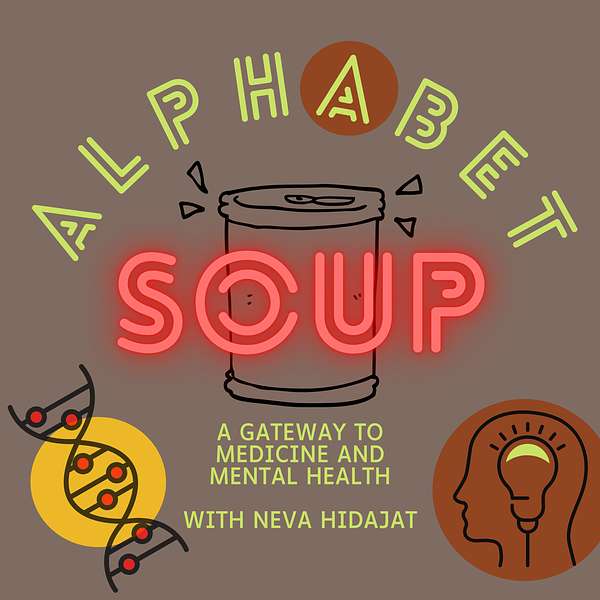
Alphabet Soup: A Mental Health & Medicine Podcast
Alphabet Soup: A Mental Health & Medicine Podcast
Ep.19 Combating the Mental Health Stigma
How the lack of education and a lack of perception creates the mental health stigma. The solution to erase it? Starting, encouraging, and participating in responsible conversations.
!!! September is National Suicide Prevention Month. visit https://suicidepreventionlifeline.org/promote-national-suicide-prevention-month/
for more info on how to participate.
Hey guys welcome back to Alphabet Soup! This is your host Neva Hidajat and today’s episode is about the mental health stigma and what we can do about it.
So, what is the mental health stigma? Well, it’s a pretty broad topic but I would limit it to being the negative misconception placed on mental health that arises from a lack of education, a lack of perception, and the nature and complications of mental illness.
Let’s dive deeper into these three categories:
First is the lack of education. In mental health, spotting the early signs of a possible condition is critical, however many people may not be able to pick up on these signs. This is due to the lack of education and awareness on mental health symptoms. A report by START Clinic for Mood and Anxiety Disorders, showed that physicians are likely to miss signs of depression about 50 to 70 percent of the time. Although this number is not the best, we must remember that most physicians do not personally know their patients the way friends or family might. So, the odds of them picking up on these often not so obvious signs are a lot slimmer.
Instead, hopefully this helps us realize how important it is for family and friends to look out for each other because if a person were to be experiencing a negative period of mental health, the people closest to that person would also have the biggest impact on their recovery.
This means that we must learn how to spot the signs. Progress in this area will stem from an improvement in the lack of education on the mental health topic. Notably, we are getting better at awareness: social media and news coverage have become platforms for spreading information and awareness on mental health. The problem is that there isn’t enough interest in gaining knowledge on mental health: for example, a person might stumble upon a post detailing the warning signs of depression, and simply scroll past it because it’s an uncomfortable topic, they are in denial that it should apply to them, or other reasons. So how can we combat this problem?
Something I think we can improve upon is to try to excite interest in mental health knowledge by campaigning mental health in our everyday lives. Go out and have responsible conversations with someone about mental health, meaning I want you to take the chance to confide in someone and let them know that it is safe for them to confide in you as well. If you just go out and talk to someone, chances are almost everyone you’ll meet will have had to deal with some kind of mental anxiety at least once in their lives. Help people realize that mental health is not embarrassing or uncommon and get them talking about it. Although social media awareness is great and should continue, we need to remember to utilize our local resources by making everyday conversation happen. Eventually, as interest in the topic picks up, the already available tools for knowledge will also be given the attention to be learned.
The next facet of mental health stigma is the lack of perception. This kind of plays into what I was saying earlier about people scrolling past a mental health post because it makes them feel uncomfortable. The thing is, even if someone does notice a sign of an issue in an individual, because of the stigma and widespread misinformation, they may be reluctant to confront or report that individual. Another issue is that although most people have experienced periods in their lives where they’ve struggled with mental health, they don’t feel comfortable sharing their experiences because it makes them feel vulnerable. This all has to do with perception because feeling vulnerable comes from being conscious about how others might perceive a person’s experiences. In other words, worrying that someone will think a person is weird because of the particular thoughts or emotions that they might have had. I get I, talking about sensitive topics is hard. But we need to try to be carry less judgement and instead live genuinely. If we try to perceive others in a more accepting light we may find that our own insecurities about how others perceive us begin to fade. So, challenge yourself to be the first to open up and see how helpful and inviting you can be to someone else
Finally, here’s what I mean by how the nature and complications of mental illness contribute to the mental health stigma. To be honest it’s pretty self-explanatory: mental illness is tailored to every single individual because not two humans are completely alike int thought process and behavior. Therefore, it is tricky to interpret what another individual is experiencing. But thanks to psychologists and psychoanalysts we have been able to come up with some clues. Changing the stigma is about sparking interest in mental health, fixing our own perception, and hopefully influencing others to do the same.
For today’s bit I would like to mention that September is National Suicide Prevention Month. There are many ways to participate. For example, tweeting an awareness post with the #BeThe1To, volunteering for the national prevention hotline, and asking people how they are doing in a caring way.
Ok guys, thank you for listening to today’s episode of Alphabet Soup, and I hope you feel encouraged to start up a conversation about mental health in your daily life.